- Home
- Robin Cook
Death Benefit Page 17
Death Benefit Read online
Page 17
“Easy,” said Jerry. “You kill him.”
Edmund turned and walked away from Jerry, back toward the house. He took a path on the side of the building and Jerry set his empty coffee cup down and followed him to the rear garden, where Edmund sat on a bench with a view of Long Island Sound. Jerry sat down next to him.
“Murder, Jerry? Like having him shot?” Edmund was appalled. At the same time he didn’t think he had the luxury of dismissing any idea out of hand no matter how preposterous it sounded.
“No, not at all. The two of them should die in a way that doesn’t invite suspicion of homicide. It must look like an accident. There shouldn’t even be an investigation, although I suppose that would be inevitable. But there can be nothing that makes this look deliberate. Because it wouldn’t be beyond the realm of possibility that any semi-competent murder investigation would lead right to LifeDeals. You sat there yourself at Statistical Solutions and talked about what this could do to the company’s bottom line.”
“Do you have any specific suggestions, Jerry?” Although the proposal was outlandish and terrifying, Edmund wanted to find out what Jerry was proposing. It wasn’t as if Edmund had any plan B waiting in the wings.
“As a matter of fact, I do.”
Edmund continued to stare out at the water.
“I’ll tell you,” said Jerry, “most of the medical people will know that Rothman’s first interest in research, before he became involved in regenerative medicine, was salmonella, which is the number-one cause of food-borne illness in general and typhoid fever in particular. He’s investigating the virulence of the bacteria—what causes it to be a tremendously deadly bacteria on the one hand, and a bothersome but nondeadly cause of gastrointestinal distress on the other. Why does one type give you the runs but another kills you? We did a little research. He’s found that growing salmonella in outer space produces a very lethal strain. He should be fed some of this particular strain.
“A lot of people don’t care for the man—they’re jealous of his Nobel Prize, and they think he’s got an attitude. If he dies from the bacteria he’s studying, a lot of people are going to say, ‘Oh, that’s terrible,’ and then smile at the irony of it later.”
Jerry made it sound so easy.
“I suppose that would be clever,” Edmund said. He felt he had to say something.
“That’s not the half of it. The typhoid fever he’d immediately develop might or might not kill him. There has to be something else that will kill him quickly and definitively, but it’s got to be something you can’t easily detect. There’s a substance called polonium-210—very radioactive and deadly if you ingest it but not harmful otherwise. We’d use it because it produces many of the same symptoms as typhoid and would be masked by it. It’s what killed Alexander Litvinenko in London a few years ago.”
“I remember that. That was just a theory, surely, the polonium.”
“I think it was more than that,” Jerry said.
“Why do we need it?”
“To make sure the guy dies. It’s very potent. The challenge is that Rothman and his sidekick work in one of the premier medical centers in the world. The salmonella, no matter how virulent it might be, cannot be counted on by itself. One or both of them could be saved. That’s a chance that cannot be taken. We need to be sure. One-hundred-percent sure, ergo the polonium, and a massive dose of it to boot.”
“So where the hell do you get this stuff? Who’s going to buy it? Russell?”
“You hire the right people. Professionals.”
“You’ve been watching too many movies,” Edmund said. “So tell me, Jerry, who is going to procure this deadly radioactive poison for us?”
“Albanians.”
“Albanians?” Edmund’s voice betrayed his skepticism.
“There’s an Albanian Mafia that’s grown big in New York in the last twenty years. Very violent, very ruthless. But also very reliable, if you do business with them. Their word is their bond and all that. The FBI put a crimp in their operations in the nineties, but they’ve grown back and they’re looking to make names for themselves again. You’re going to ask, how do I know? I got this from a man who spent years of his life trying to put these guys in jail. He gave me a name.”
Jerry held out a piece of paper, folded in half, for Edmund. Edmund thrust his hands in his coat pockets and looked at Jerry.
“You’re out of your fucking mind.”
Jerry let Edmund stew for a couple of minutes. Edmund had moved down to the edge of his property and was standing, looking out at the gray water of the Sound. Jerry could imagine Edmund’s state of mind—part of him horrified to even consider such a thing, another part telling him he had no option but to consider doing it. Which side was winning? Jerry decided to play his trump card. He didn’t want to have to do this either, but again, there was no choice. He walked down to join Edmund and stood about four feet to his right, looking ahead.
“I know about you and Gloria Croft.”
“What about me and Gloria Croft? You mean personally?” Edmund waited a beat, then turned to look at Jerry, who was stony-faced and staring straight ahead.
“What’s that got to do with anything?”
“So you know what I’m talking about?”
“Yes, yes. Gloria and I had a . . . a thing when we were working together.”
“When you were her boss.”
“Yes, Jerry, Jesus, what does that have to do with anything?”
“You got married young, I believe.”
“I was married at the time. I admit it, I was a bad boy. I got carried away, and I wasn’t the only one who’s ever done that. You tell me you never did. But I learned my lesson. I steer very clear of bitches like her.”
“So no harm, no foul is what you’re saying, right, Edmund?”
“Jerry, I swear I have no idea what the relevance of this is. You just asked me to kill two people, for Christ’s sake.” Edmund turned his head as he said it, checking that no one had joined them. “Are you trying to put pressure on me with this?”
“There’s something I don’t think you’re aware of. I was hoping I wouldn’t have to bring this up, but it seems like you leave me no option.” Jerry looked at Edmund. He had crossed one bridge with Edmund a few minutes ago. Now he was going to burn it down.
“When you were sleeping with Gloria Croft, she got pregnant—”
“Oh, bullshit, Jerry—”
“She got pregnant, Edmund, and she had a termination, and it didn’t go well. She used a good clinic, I can give you the name, but the procedure had some serious complications. I can give you details, if you need them. She survived, but it left her sterile, so she can’t have children. And I would imagine it also left her with a lot of resentment for the man involved.”
“Why should I believe this?” Edmund’s face was dark with fury, his hands bunched into fists still thrust deep into his coat pockets, his left hand throbbing from punching the elevator door. He leaned toward Jerry, almost goading him.
“You’re trying to blackmail me? I can’t believe you.”
“The information came up quite by chance,” Jerry said. He was surprised how remarkably calm he felt. “We were looking for dirt on Gloria when we heard about this. I know someone who has contacts in the records department at certain hospitals, and he found the relevant file. The timing’s right, we checked, and there’s even a note in there saying that she only had one sexual partner. They were ruling out some STDs, so they asked. My guess is that partner was you.”
“Bullshit.”
“You use a condom every time, Edmund? She miss a bit of work around the time you stopped seeing each other? You might not remember, but I doubt you liked your analysts taking a lot of time off. And perhaps she left the company soon after that, am I right?”
Edmund sighed. He felt deflated, almost literally, as if the air had been sucked out of his lungs. He stared back out at the water again.
“So what will you do with this informati
on? And I’m not saying it’s true.”
“I said just now what a lovely wife you have, what a beautiful home. It’s true, of course. I’m just pointing out to you what’s at stake here, Edmund. You might not see things as clearly as I do. We’ve all worked so hard to get what we have, and there are so many people who are jealous of us, who say we don’t deserve all this, but we both know the truth. We earned everything we have. Without us, this country would be starved of innovation. Nothing new would be created. Okay, so someone’s going to grow organs outside of the body, but not now, not when they’ll destroy this wonderful product of yours. It’s a fantastic idea that you had. And you have to protect it.”
Jerry paused.
“Now you say what I just told you is bullshit. It’s not all bullshit, is it? It can’t be. And what’s Alice going to say if she gets a note that says her husband slept with his analyst, and she got pregnant? I doubt she’s going to be placated that easily, just by telling her it’s all bullshit.”
Edmund said nothing.
“I’m telling you, these Albanian guys can make all of this go away. I assure you they have done more difficult things than this. It turns out that it’s true what they say: money really can buy you anything. Just look around you, Edmund, you just have too much to lose.”
“What about Gloria Croft?”
“Don’t worry about her,” Jerry said. “She’ll get hers when LifeDeals share price skyrockets.”
Jerry held out the piece of paper again. This time, Edmund wearily put out his hand and took the scrap, unfolded it and read it. Jerry touched him once on the shoulder with his left hand and turned and walked back toward the house. Edmund stood where he was, staring at the name written on the paper, a name that meant nothing to him, and everything.
PART II
25.
COLUMBIA UNIVERSITY MEDICAL CENTER
NEW YORK CITY
MARCH 23, 2011, 12:02 P.M.
Tobias Rothman was happiest when he could work uninterrupted in the safe confines of the lab, with Dr. Yamamoto at his side. Yamamoto was like Rothman’s right arm. He could hold out a hand, and Yamamoto would know what he wanted without him having to ask for it. The two men communicated by looks and pointed fingers and sometimes, Rothman swore, by intuition. If Rothman could intuit anything as they worked together under the hood in the biosafety level-3 lab today, it was that his colleague didn’t feel so good because a couple of times he’d uncharacteristically missed Rothman’s cues. In truth, Rothman hadn’t been feeling particularly well himself for the last hour or so. He had some mild gastric distress but worse was a kind of light-headedness, as if he were walking on eggshells. It had started about an hour after their coffee break at nine. They’d been in the unit since six.
Rothman looked over at Yamamoto. He was facing the wall, resting his hands on the lab bench, breathing hard. Yamamoto turned to look at Rothman, and Rothman could see that he was shivering. With a hood and mask, all Rothman could see of Yamamoto’s face were his eyes, which reflected fear. Suddenly Rothman felt it too, and began to shiver himself. It was as if he’d just jumped into a bath of ice water, yet he was sweating, and he felt nauseous. It was impossible that what flashed through his mind could be happening—they’d taken all their usual precautions, and their safety record was perfect.
The next moment Yamamoto’s eyes rolled up in his head, and he collapsed limply onto the floor. Rothman tried to steady himself before going to Yamamoto’s aid, but he felt suddenly much worse. The room swam before him. He knew he was going to black out and just before he did, his hand reached for the red button on the wall.
Pia was sitting in her office comparing notes with Will and Lesley. It was crowded but quiet. They’d taken refuge in there despite its diminutive size as there was yet another workman in the lab proper, again working up in the ceiling with all the electrical wires. He’d briefly been in her office as well as Rothman’s but thankfully had left both. Luckily it wasn’t the same guy, Vance, who’d been such a pain weeks earlier.
The three students had formed an effective unit in their three weeks together and were making good progress with the temperature and pH issues with the organ baths. They’d spent almost all of their waking hours including weekends in the lab, but none of them begrudged a minute of it.
Then, in an instant, it was as if a riot had broken out at the door to the lab.
“What the hell?” Will said, as the three students piled out of Pia’s office.
From her vantage point, all Pia could see were people barging in through the door. The place was being invaded—she must have seen twenty people dressed in gowns, hats, masks, and booties rush toward the biosafety unit. Bringing up the rear was a pair of gurneys sprouting IV poles with plastic bags of IV fluid slapping against the metal poles, pushed by more gowned-up figures. The gurneys disappeared into the biosafety unit, whose door had been propped open with a doorstop. Pia felt a terrible sensation growing in the pit of her stomach.
One man stopped by Marsha’s desk and stood next to the terrified secretary, who had a hand clasped over her mouth; another blocked off the entrance door, which was again closed, denying access to the corridor and the rest of the medical center. The laboratory staff crowded into the center of the room and there was a ripple of loud conversation and shouted questions.
“Is this a drill?” Lesley said. “What’s going on?”
The figure by Marsha’s desk pulled down his mask. He was a fifty-something African-American man with skin as black as ebony; his voice was calm yet commanding.
“Okay, folks, this is not a drill. We have a situation, and I need you all to stay right here, right where you are. Is everyone in the lab accounted for?”
People looked around, checking for coworkers among the fifteen or so technicians and support staff standing around. Pia could see the maintenance man in his coveralls standing at the back of the room, gaping like everyone else.
“Everybody here? Okay. My name’s David Winston. I’m from hospital security. These other people are a mixed group from the hospital ER and the Department of Infectious Disease. I’ll give you more information when we have it. I am asking you to please remain in this area. Thank you for your cooperation.”
The staff stood in small groups and talked among themselves. Pia, unable to stay still, walked around in a small, tight circle. Whatever was happening, she knew it wasn’t good. A wave of anxiety washed over her.
The lab door opened abruptly and a tall, distinguished-looking man walked in quickly and made his way through the cordon toward the biosafety unit, conspicuously avoiding eye contact with anyone. He was dressed in protective clothing like the others except his mask hung down on his chest. Under the gown was a suit, not scrubs like the others. Pia knew this was the chief of Infectious Disease, Dr. Helmut Springer, as she had attended several lectures he’d given during second-year pathology.
The background buzz of conversation grew louder. Most recognized Dr. Springer. Everyone in the lab was well aware that they worked with highly virulent and contagious microorganisms. Was it possible there’d been some contamination of the lab? Where were Dr. Rothman and Dr. Yamamoto? Springer’s appearance only heightened the tension. The man by the door was on a cell, apparently quarterbacking whatever was happening. “We’re on our way, ETA five minutes,” he was heard to bark into his phone.
Quickly tying his mask in place, Springer pulled the biosafety unit door fully open. As if on cue, the gurneys reappeared, the one in front carrying Dr. Rothman, Dr. Yamamoto in the rear. Both men had IVs and were wearing oxygen masks. Rothman passed right in front of Pia, who pushed forward to take a look. She could see he was deathly pale and shivering violently. His eyes were fixed straight ahead, staring at the ceiling. He looked like death.
As fast as they had come, the cavalcade of medics was gone. Only Dr. Springer and Winston remained. Springer addressed the shell-shocked staff, a few of whom were clutching each other for comfort, others holding their hands over their
mouths in disbelief at what they had just witnessed.
“As you can see, Doctors Rothman and Yamamoto have been taken ill. At first guess, we have to consider it to be severe typhoid fever. Both men are presenting the classic symptoms—fever, sudden prostration, abdominal distress, delirium, right lower quadrant borborygmi.” Springer counted off the symptoms on the fingers of his left hand as if he were on formal grand rounds. Once a professor always a professor, thought Pia. “Obviously, they were working in the biosafety unit. But can anyone tell me what they were working on exactly?”
Lab technician Panjit Singh stepped forward. “They were working on salmonella strains grown in the space station lab. I know that for a fact because I set everything up for them this morning. They’ve been working on it for weeks.”
“Okay, thanks, that’s very useful. Do you know if there are any antibiotic-sensitivity studies available for these special strains?”
“Yes, lots of them. I can get them for you.”
“That’s good, I’m going to need them, thank you. Mr. Winston here will talk to you about procedure a bit later, but here’s a thumbnail: no one is to go into the level-three lab until it’s cleared. The Rothman lab itself will be off-limits until further notice. I’ve already put in a call to the CDC to get their help on the epidemiology side so we can find out how this contamination occurred. Right now, everyone needs to follow me to the Infectious Disease Clinic, where you’ll be screened for typhoid fever. Everyone will also need to take a prophylactic course of antibiotics. This is very important. For the next week you’ll have to monitor your own temperature twice a day. Anything unusual, come in right away. A degree either side of normal, I want to see you. Any questions?”
“Who raised the alarm?” Singh asked.
“There’s a panic button in the biosafety lab,” Springer said. “One of the doctors must have hit it. We’ll check the tape.”

 Shock
Shock Mutation
Mutation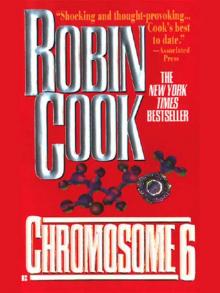 Chromosome 6
Chromosome 6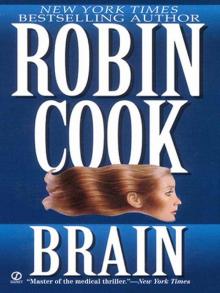 Brain
Brain Intervention
Intervention Invasion
Invasion The Legend of Parzival: The Epic Story of His Quest for the Grail
The Legend of Parzival: The Epic Story of His Quest for the Grail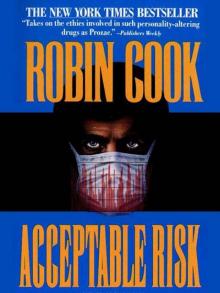 Acceptable Risk
Acceptable Risk Cell
Cell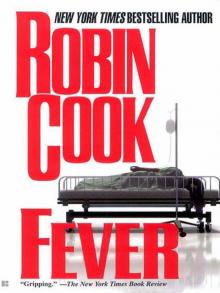 Fever
Fever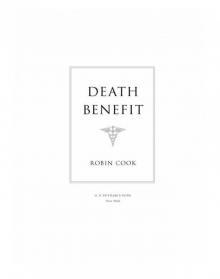 Death Benefit
Death Benefit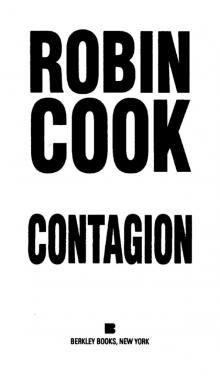 Contagion
Contagion Mindbend
Mindbend Coma
Coma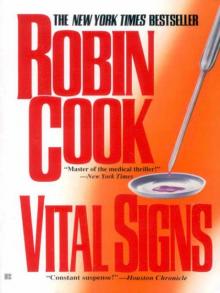 Vital Signs
Vital Signs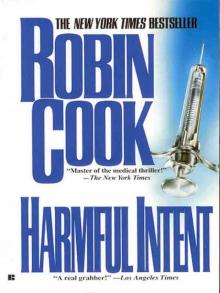 Harmful Intent
Harmful Intent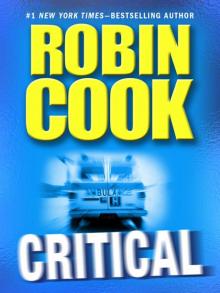 Critical
Critical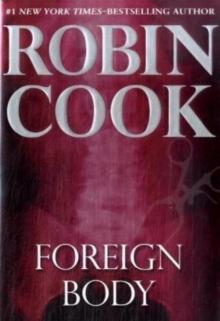 Foreign Body
Foreign Body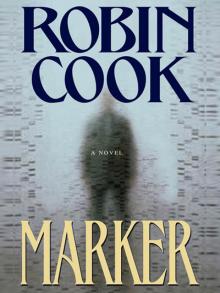 Marker
Marker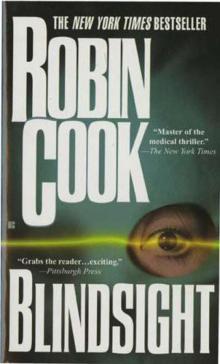 Blindsight
Blindsight Terminal
Terminal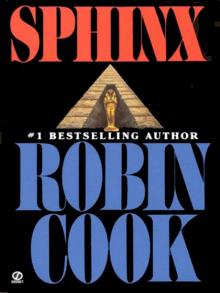 Sphinx
Sphinx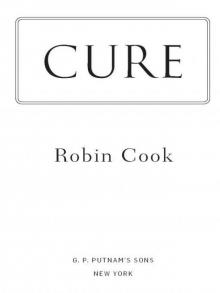 Fatal Cure
Fatal Cure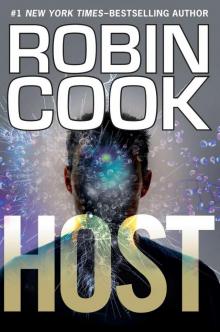 Host
Host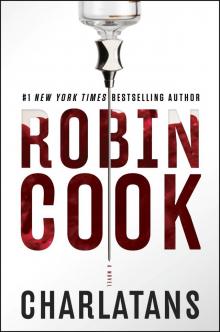 Charlatans
Charlatans Crisis
Crisis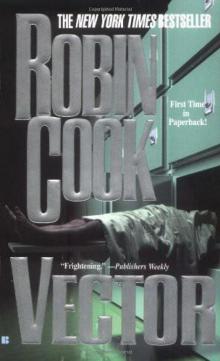 Vector
Vector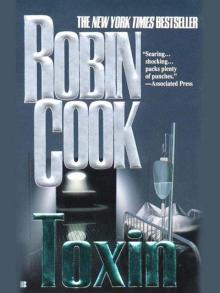 Toxin
Toxin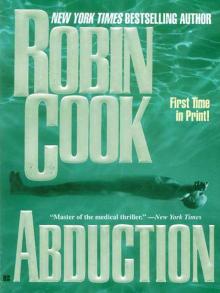 Abduction
Abduction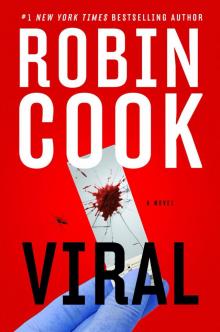 Viral
Viral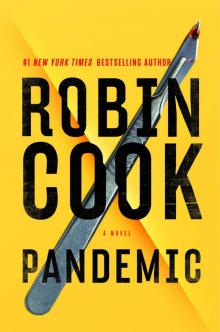 Pandemic
Pandemic Outbreak
Outbreak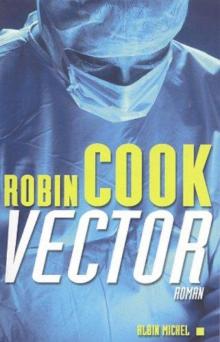 Vector js&lm-4
Vector js&lm-4 Godplayer
Godplayer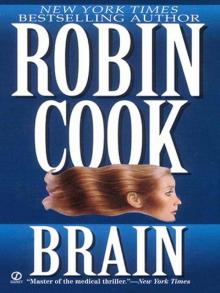 A Brain
A Brain Year of the Intern
Year of the Intern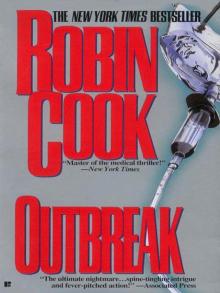 Outbreak dmb-1
Outbreak dmb-1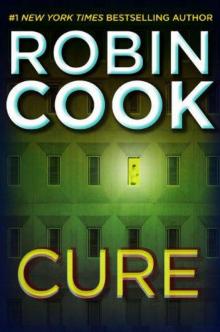 Cure
Cure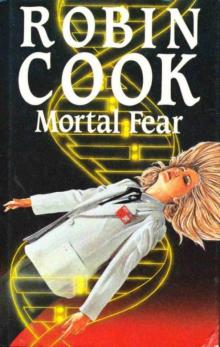 Mortal Fear
Mortal Fear The Legend of Parzival
The Legend of Parzival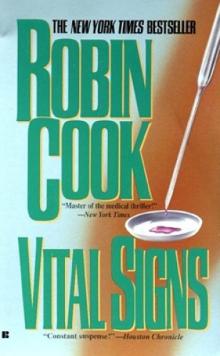 Vital Signs dmb-2
Vital Signs dmb-2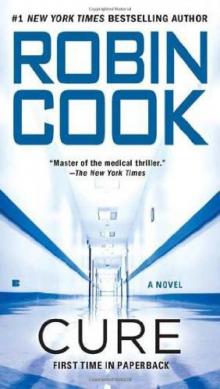 Cure (2010) sam-10
Cure (2010) sam-10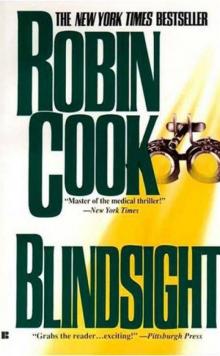 Blindsight sam-1
Blindsight sam-1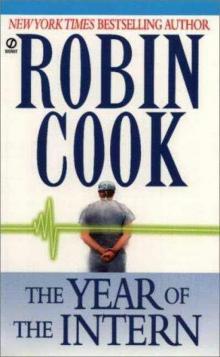 The Year of the Intern
The Year of the Intern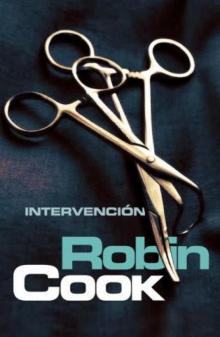 Intervention sam-9
Intervention sam-9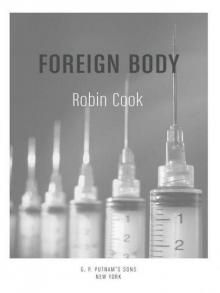 Foreign Body sam-8
Foreign Body sam-8